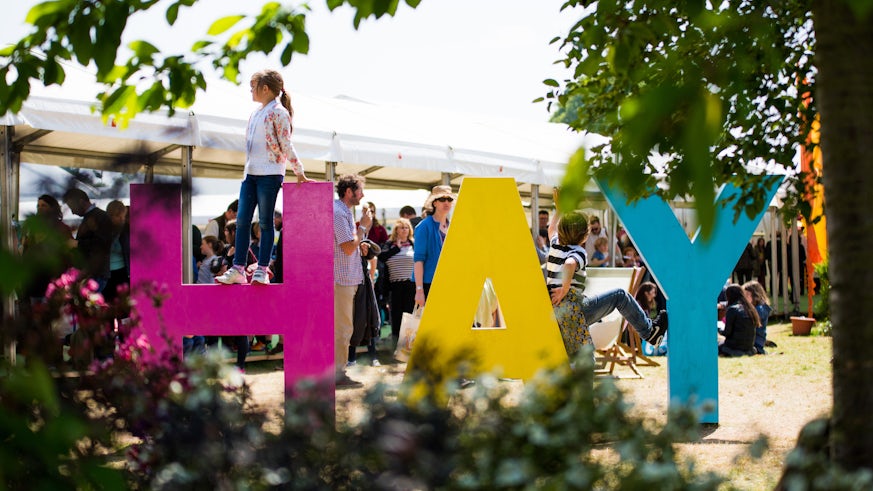Healing Brexit generational divide
22 May 2017

Cardiff University experts will consider how to heal the generational divide following the divisive EU referendum, at this year’s 30th anniversary Hay Festival.
Dr Dan Evans, Dr Esther Muddiman, Dr Stuart Fox and Dr Sioned Pearce will consider the striking divisions revealed between generations in the result of the 2016 EU referendum.
A majority of 18-24-year-olds voted to remain while a majority of over-65s voted to leave, so the panel will consider how to connect the generations, in a discussion on Thursday 1 June at 16:00.
The panellists are all research associates at the Wales Institute for Social and Economic Research, Data and Methods in Cardiff.
Shedding light on innovative work

This year’s Cardiff Series of Cardiff University events at Hay sees researchers shedding light on their innovative work in areas as diverse as viruses, food labelling, big data justice and the maths of mapping and networks.
The Hay Festival runs in the mid Wales town from Thursday 25 May to Sunday 4 June.
Dr Simone Cuff, School of Medicine, kicks off the Cardiff Series when she considers whether viruses could be good for us, in her talk on Friday 26 May at 16:00.
Dr Cuff said: “When most people think of viruses, they think of viruses such as flu or Ebola that make us ill. That is only one side of the story though.
“New techniques applied to virology are changing our understanding of the place of viruses in our bodies, showing us that the ecology of viruses is much more complex than we thought...”
“Without viruses we quite literally would not be the people that we are.”
Next up is Dr Rhyd Lewis from the School of Mathematics who will look at the various ways that networks and graphs intermingle with our daily lives, on Tuesday 30 May at 10:00.
He will consider questions such as: How do satnavs find the quickest route from A to B? What is the most efficient way to visit the best pubs in the UK? And is it true that all living things in the world are six or fewer steps away from each other?

“This talk will give a pictorial tour of the many problems in everyday life that can be modelled as networks, from the problems of colouring maps to the scheduling of sports leagues; from determining walking tours around ancient cities in Prussia, to the way Facebook makes friend recommendations.”

One of the Hay 30
Also on the Tuesday, at 17:30, Dr Lina Dencik from the School of Journalism, Media & Cultural Studies considers a world with the technical ability to turn our activities and behaviour into data points that can be tracked and profiled.
Dr Dencik said: “This is often said to advance responses to a range of social problems, but these data processes can also affect individuals or entire communities that may be denied services and access to opportunities, or wrongfully targeted and exploited...”

“What does this mean for fairness and equality, and the pursuit of social justice more broadly?”
Dr Dencik has been selected as one of the Hay 30 - young scientists, novelists, philosophers, performers and activists who will “help imagine and shape the world in the next 30 years”.
Dr Angelina Sanderson Bellamy, School of Geography & Planning/Sustainable Places Research Institute, analyses whether food certifications are worth the paper they are written on.
Such schemes are meant to reassure consumers that food is produced in a more ecologically friendly way or improves the welfare of producers and labourers but do they? The results of recent research published by Dr Sanderson Bellamy suggests otherwise.
“But what does this mean and what is the way forward for food labelling schemes?” she asks.
“How do we ensure that consumers can be confident about the positive impact of their food purchases?”
Dr Sanderson Bellamy appears on Wednesday 31 May at 16:00.

Outside of the Cardiff Series, the best of contemporary Latin American poetry and two of the finest living Latin American writers will feature in events curated by Cardiff University’s Director of Creative Writing.
Following his major anthology of Contemporary Latin America, poet and writer Professor Richard Gwyn is joined by Argentinian writer Andrés Neuman and Welsh poet Clare Potter for The Other Tiger on Friday 2 June at 19:00.
And in Gabo & Bolaño, Professor Gwyn, who is Professor of Creative Writing at the School of English, Communication and Philosophy, will chair a discussion by a trio of leading Latin American contemporary writers about the acclaimed work of Gabriel García Márquez and Roberto Bolaño. This takes place at 10:00 on Saturday 3 June.
Share this story
Meet the engaged innovators using cutting-edge research to produce benefits for the economy, society and the environment.






